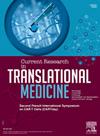Immune cell dysfunction: A critical player in development of diabetes complications
IF 3
4区 医学
Q2 MEDICINE, RESEARCH & EXPERIMENTAL
引用次数: 0
Abstract
Diabetes mellitus, a global health challenge, influences millions worldwide by leading to severe complications and premature death. A key factor in its pathogenesis is immune cell dysfunction, which aggravates both type 1 and type 2 diabetes. The important role that immune cell dysregulation plays in the emergence of diabetes complications is investigated in this research. It highlights the manner in which diabetes compromises the immune system's adaptive as well as innate responses. Key defects in innate immunity include impaired pathogen recognition, and dysfunctional behavior of macrophages, neutrophils, and natural killer (NK) cells. Additionally, the complement system is dysregulated, and cytokine production is altered, affecting overall immune signaling. The study investigates the dysfunction of several T and B cell subsets, such as CD4+ T cells, CD8+ T cells, regulatory T cells, and B cells, in relation to adaptive immunity. These dysfunctions collectively contribute to chronic inflammation, reduced pathogen clearance, and increased susceptibility to infections, ultimately exacerbating diabetes complications. Developing targeted therapies to reduce diabetes complications and enhance patient outcomes requires an understanding of these mechanisms.

免疫细胞功能障碍:糖尿病并发症发生的关键因素
糖尿病是一项全球性的健康挑战,通过导致严重并发症和过早死亡,影响着全世界数百万人。其发病机制的一个关键因素是免疫细胞功能障碍,它加重了1型和2型糖尿病。本研究探讨了免疫细胞失调在糖尿病并发症发生中的重要作用。它强调了糖尿病损害免疫系统适应性和先天反应的方式。先天免疫的关键缺陷包括病原体识别受损,巨噬细胞、中性粒细胞和自然杀伤细胞(NK)行为失调。此外,补体系统失调,细胞因子产生改变,影响整体免疫信号。该研究探讨了几种T细胞和B细胞亚群的功能障碍,如CD4+ T细胞、CD8+ T细胞、调节性T细胞和B细胞与适应性免疫的关系。这些功能障碍共同导致慢性炎症,减少病原体清除,增加对感染的易感性,最终加剧糖尿病并发症。开发靶向治疗以减少糖尿病并发症和提高患者预后需要了解这些机制。
本文章由计算机程序翻译,如有差异,请以英文原文为准。
求助全文
约1分钟内获得全文
求助全文
来源期刊

Current Research in Translational Medicine
Biochemistry, Genetics and Molecular Biology-General Biochemistry,Genetics and Molecular Biology
CiteScore
7.00
自引率
4.90%
发文量
51
审稿时长
45 days
期刊介绍:
Current Research in Translational Medicine is a peer-reviewed journal, publishing worldwide clinical and basic research in the field of hematology, immunology, infectiology, hematopoietic cell transplantation, and cellular and gene therapy. The journal considers for publication English-language editorials, original articles, reviews, and short reports including case-reports. Contributions are intended to draw attention to experimental medicine and translational research. Current Research in Translational Medicine periodically publishes thematic issues and is indexed in all major international databases (2017 Impact Factor is 1.9).
Core areas covered in Current Research in Translational Medicine are:
Hematology,
Immunology,
Infectiology,
Hematopoietic,
Cell Transplantation,
Cellular and Gene Therapy.
 求助内容:
求助内容: 应助结果提醒方式:
应助结果提醒方式:


